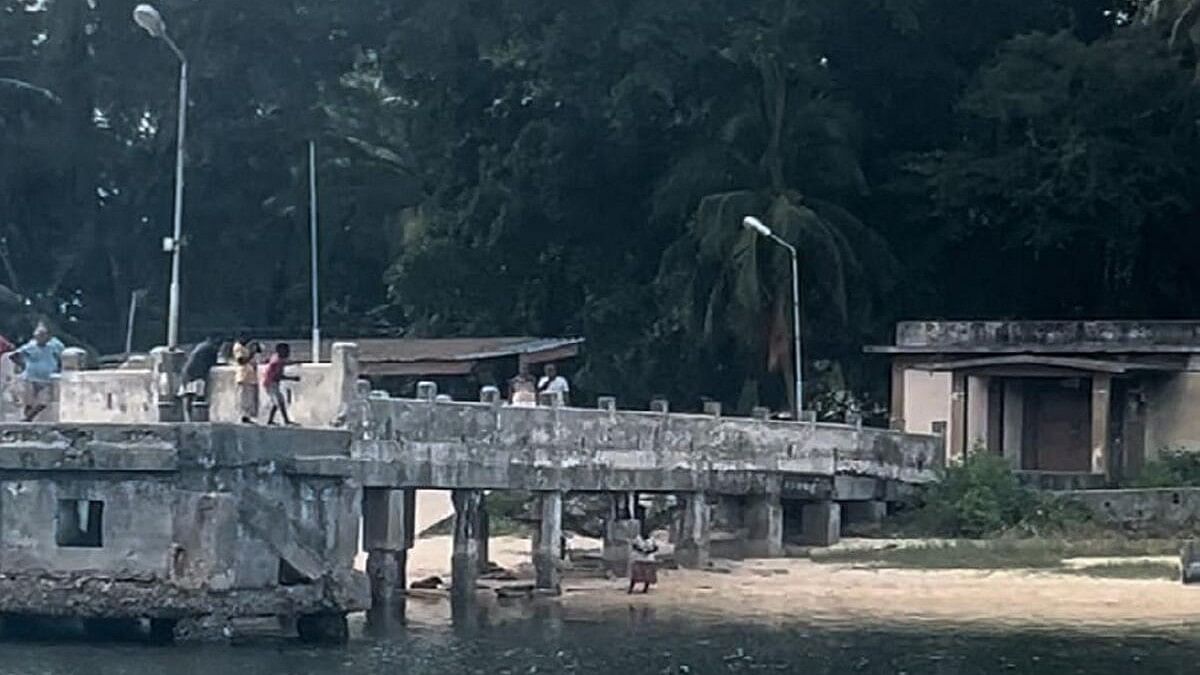
Onge tribals wait at the Dugong Creek Jetty for daily essentials from the local administration in Andaman and Nicobar Islands.
Credit: PTI Photo
Port Blair: The gradual integration of tribals in Andaman and Nicobar Islands into mainstream society has sparked mixed reactions with some experts expressing concern that it could lead to their exploitation by outsiders, while others believe it is essential for their survival, advocating for education to help them adapt to societal changes.
This trend is primarily noticed among Particularly Vulnerable Tribal Groups (PVTGs) such as Shompens, Jarawas (Ang), Onges, and the Great Andamanese who live in their respective reserved dense forests where non-tribals are barred.
A watershed moment took place on April 19, 2024, when Nauaaw and six other Shompens, including Jetuwai, Thuwaee, and Chemai, voted in the Lok Sabha elections for the first time, marking a significant milestone for their community.
Shompens are predominantly uncontacted nomadic hunters, with a population of 244 on Nicobar Island.
Nicobar Island is currently in the news due to the Rs 72,000-crore international transshipment project by the Centre, which some fear might displace the Shompens.
However, local administration officials claimed that the project is proposed for an area not inhabited by the Shompens, as they had already moved inside jungles following the 2004 tsunami.
Amidst the controversy surrounding the project, some Shompens, who had preferred isolation, participated in the voting process, signalling a step towards gradual integration into mainstream society.
Additionally, some members are in touch with government tamiyos (caretakers in Shompen language) for essentials, which anthropologists view as the beginning of a broader shift towards integration at their own willingness.
Dr Pronob Sircar, Tribal Welfare Officer at the Andaman Adim Janjati Vikas Samiti (AAJS), explained, "The gradual integration of PVTGs is occurring through tribal policies that encourage developing communication channels and participation based on their willingness." He added that the Ang tribe is also adapting to mainstream lifestyles, with initiatives like the 'Ang Katha' educational module documenting their rituals and ethnobotanical knowledge.
"Similar educational modules are in place for other PVTGs, which will help them differentiate between societal norms," he said.
While some experts argue that such integration threatens indigenous cultures, the Union Ministry of Tribal Affairs asserts that it aims to empower and stabilise these populations.
Union Minister for Tribal Affairs Jual Oram emphasised, "Integration is based on the tribes' willingness, not coercion, and aims to balance modernisation with cultural preservation." Personalities like Great Andamanese Queen Surmai, Onge King Totoko, and Nicobar Prince Rashid support gradual integration.
Onge King Totoko works for the Public Welfare Department in Dugong Creek, and his neighbours, Rakabegi and Oroti, hold government positions.
Similarly, significant social transformation is evident among the Great Andamanese, who previously rarely left their settlement areas.
Techa became the first Great Andamanese to clear the NEET-2022 exam, highlighting her challenging journey from Strait Island.
"My journey from remote Strait Island to Port Blair and then clearing the NEET was challenging. My concern was my acceptance in the outside world," she said.
Olake, another Great Andamanese, a junior engineer in the PWD department, said, "It’s time to think beyond the jungles for a career." Notably, nine Great Andamanese, including Buro, Ellage, and Morophoo, now work in the police force, overseeing lookout posts and performing clerical duties. Buro reflected, "From living in the jungle to wearing khaki... I am speechless." Recently, Solomon Samuel became the first Nicobari to be promoted to deputy superintendent of police.
Andamanese sportspersons like Moore (cricket), Dech (archery), and Jurol (archery) are also making strides in their fields.
Visits to PVTG homes reveal the adoption of modern amenities such as televisions, music systems, and personal care products.
SA Awaradi, former Director of the Andaman Nicobar Tribal Research Institute (ANTRI), observed, "It is evident that PVTGs will integrate into mainstream society eventually. Instead of merely providing aid, well-considered welfare programmes are needed to help them coexist with the broader population without exploitation." Awaradi also noted that the Great Andamanese have largely lost their ethnic culture, now using Hindi, while some Onge youths are becoming enamoured with movies and television and developed a taste for alcohol.
Traditional skills like canoe building and hunting have declined, replaced by a diet high in carbohydrates.
Nevertheless, the local administration contends that gradual integration has benefited PVTG communities.
In an official statement recently, the Tribal Welfare Department highlighted, "Positive interventions in healthcare and education have stabilised tribal populations and inspired their younger generations to pursue better job opportunities." Over the past decade, support has enabled 26 Andamanese and seven Onge PVTGs to secure government positions across various departments.
Addressing the adoption of new habits among PVTGs, the statement noted, "As Andamanese PVTGs interact more with mainstream society, they may adopt new preferences like cosmetics and electronic items. This can lead to gradual changes in their cultural practices, but personal autonomy allows people to make personal choices."